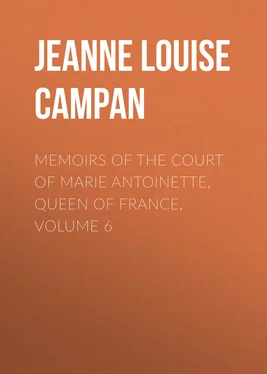Jeanne Louise Henriette Campan - Memoirs of the Court of Marie Antoinette, Queen of France, Volume 6
Здесь есть возможность читать онлайн «Jeanne Louise Henriette Campan - Memoirs of the Court of Marie Antoinette, Queen of France, Volume 6» — ознакомительный отрывок электронной книги совершенно бесплатно, а после прочтения отрывка купить полную версию. В некоторых случаях можно слушать аудио, скачать через торрент в формате fb2 и присутствует краткое содержание. Жанр: Биографии и Мемуары, История, foreign_edu, foreign_antique, foreign_prose, на английском языке. Описание произведения, (предисловие) а так же отзывы посетителей доступны на портале библиотеки ЛибКат.
- Название:Memoirs of the Court of Marie Antoinette, Queen of France, Volume 6
- Автор:
- Жанр:
- Год:неизвестен
- ISBN:нет данных
- Рейтинг книги:4 / 5. Голосов: 1
-
Избранное:Добавить в избранное
- Отзывы:
-
Ваша оценка:
- 80
- 1
- 2
- 3
- 4
- 5
Memoirs of the Court of Marie Antoinette, Queen of France, Volume 6: краткое содержание, описание и аннотация
Предлагаем к чтению аннотацию, описание, краткое содержание или предисловие (зависит от того, что написал сам автор книги «Memoirs of the Court of Marie Antoinette, Queen of France, Volume 6»). Если вы не нашли необходимую информацию о книге — напишите в комментариях, мы постараемся отыскать её.
Memoirs of the Court of Marie Antoinette, Queen of France, Volume 6 — читать онлайн ознакомительный отрывок
Ниже представлен текст книги, разбитый по страницам. Система сохранения места последней прочитанной страницы, позволяет с удобством читать онлайн бесплатно книгу «Memoirs of the Court of Marie Antoinette, Queen of France, Volume 6», без необходимости каждый раз заново искать на чём Вы остановились. Поставьте закладку, и сможете в любой момент перейти на страницу, на которой закончили чтение.
Интервал:
Закладка:
In order not to leave out any of the Queen's diamonds, I requested the first tirewoman to give me the body of the full dress, and all the assortment which served for the stomacher of the full dress on days of state, articles which always remained at the wardrobe.
The superintendent and the dame d'honneur being absent, the first tirewoman required me to sign a receipt, the terms of which she dictated, and which acquitted her of all responsibility for these diamonds. She had the prudence to burn this document on the 10th of August, 1792.—[The date of the sack of the Tuileries and slaughter of the Swiss Guard]—The Queen having determined, upon the arrest at Varennes, not to have her diamonds brought back to France, was often anxious about them during the year which elapsed between that period and the 10th of August, and dreaded above all things that such a secret should be discovered.
In consequence of a decree of the Assembly, which deprived the King of the custody of the Crown diamonds, the Queen had at this time already given up those which she generally used.
She preferred the twelve brilliants called Hazarins, from the name of the Cardinal who had enriched the treasury with them, a few rose-cut diamonds, and the Sanci. She determined to deliver, with her own hands, the box containing them to the commissioner nominated by the National Assembly to place them with the Crown diamonds. After giving them to him, she offered him a row of pearls of great beauty, saying to him that it had been brought into France by Anne of Austria; that it was invaluable, on account of its rarity; that, having been appropriated by that Princess to the use of the Queens and Dauphinesses, Louis XV. had placed it in her hands on her arrival in France; but that she considered it national property. "That is an open question, Madame," said the commissary. "Monsieur," replied the Queen, "it is one for me to decide, and is now settled."
My father-in-law, who was dying of the grief he felt for the misfortunes of his master and mistress, strongly interested and occupied the thoughts of the Queen. He had been saved from the fury of the populace in the courtyard of the Tuileries.
On the day on which the King was compelled by an insurrection to give up a journey to St. Cloud, her Majesty looked upon this trusty servant as inevitably lost, if, on going away, she should leave him in the apartment he occupied in the Tuileries. Prompted by her apprehensions, she ordered M. Vicq-d'Azyr, her physician, to recommend him the waters of Mont d'Or in Auvergne, and to persuade him to set off at the latter end of May. At the moment of my going away the Queen assured me that the grand project would be executed between the 15th and the 20th of June; that as it was not my month to be on duty, Madame Thibaut would take the journey; but that she had many directions to give me before I went. She then desired me to write to my aunt, Madame Cardon, who was by that time in possession of the clothes which I had ordered, that as soon as she should receive a letter from M. Augur, the date of which should be accompanied with a B, an L, or an M, she was to proceed with her property to Brussels, Luxembourg, or Montmedy. She desired me to explain the meaning of these three letters clearly to my sister, and to leave them with her in writing, in order that at the moment of my going away she might be able to take my place in writing to Arras.
The Queen had a more delicate commission for me; it was to select from among my acquaintance a prudent person of obscure rank, wholly devoted to the interests of the Court, who would be willing to receive a portfolio which she was to give up only to me, or some one furnished with a note from the Queen. She added that she would not travel with this portfolio, and that it was of the utmost importance that my opinion of the fidelity of the person to whom it was to be entrusted should be well founded. I proposed to her Madame Vallayer Coster, a painter of the Academy, and an amiable and worthy artist, whom I had known from my infancy. She lived in the galleries of the Louvre. The choice seemed a good one. The Queen remembered that she had made her marriage possible by giving her a place in the financial offices, and added that gratitude ought sometimes to be reckoned on. She then pointed out to me the valet belonging to her toilet, whom I was to take with me, to show him the residence of Madame Coster, so that he might not mistake it when he should take the portfolio to her. The day before her departure the Queen particularly recommended me to proceed to Lyons and the frontiers as soon as she should have started. She advised me to take with me a confidential person, fit to remain with M. Campan when I should leave him, and assured me that she would give orders to M. – to set off as soon as she should be known to be at the frontiers in order to protect me in going out. She condescended to add that, having a long journey to make in foreign countries, she determined to give me three hundred louis.
I bathed the Queen's hands with tears at the moment of this sorrowful separation; and, having money at my disposal, I declined accepting her gold. I did not dread the road I had to travel in order to rejoin her; all my apprehension was that by treachery or miscalculation a scheme, the safety of which was not sufficiently clear to me, should fail. I could answer for all those who belonged to the service immediately about the Queen's person, and I was right; but her wardrobe woman gave me well-founded reason for alarm. I mentioned to the Queen many revolutionary remarks which this woman had made to me a few days before. Her office was directly under the control of the first femme de chambre, yet she had refused to obey the directions I gave her, talking insolently to me about "hierarchy overturned, equality among men," of course more especially among persons holding offices at Court; and this jargon, at that time in the mouths of all the partisans of the Revolution, was terminated by an observation which frightened me. "You know many important secrets, madame," said this woman to me, "and I have guessed quite as many. I am not a fool; I see all that is going forward here in consequence of the bad advice given to the King and Queen; I could frustrate it all if I chose." This argument, in which I had been promptly silenced, left me pale and trembling. Unfortunately, as I began my narrative to the Queen with particulars of this woman's refusal to obey me,—and sovereigns are all their lives importuned with complaints upon the rights of places,—she believed that my own dissatisfaction had much to do with the step I was taking; and she did not sufficiently fear the woman. Her office, although a very inferior one, brought her in nearly fifteen thousand francs a year. Still young, tolerably handsome, with comfortable apartments in the entresols of the Tuileries, she saw a great deal of company, and in the evening had assemblies, consisting of deputies of the revolutionary party. M. de Gouvion, major-general of the National Guard, passed almost every day with her; and it is to be presumed that she had long worked for the party in opposition to the Court. The Queen asked her for the key of a door which led to the principal vestibule of the Tuileries, telling her she wished to have a similar one, that she might not be under the necessity of going out through the pavilion of Flora. M. de Gouvion and M. de La Fayette would, of course, be apprised of this circumstance, and well-informed persons have assured me that on the very night of the Queen's departure this wretched woman had a spy with her, who saw the royal family set off.
As soon as I had executed all the Queen's orders, on the 30th of May, 1791, I set out for Auvergne, and was settled in the gloomy narrow valley of Mont d'Or, when, about four in the afternoon of the 25th of June, I heard the beat of a drum to call the inhabitants of the hamlet together. When it had ceased I heard a hairdresser from Bresse proclaim in the provincial dialect of Auvergne: "The King and Queen were taking flight in order to ruin France, but I come to tell you that they are stopped, and are well guarded by a hundred thousand men under arms." I still ventured to hope that he was repeating only a false report, but he went on: "The Queen," with her well-known haughtiness, lifted up the veil which covered her face, and said to the citizens who were upbraiding the King, "Well, since you recognise your sovereign, respect him." Upon hearing these expressions, which the Jacobin club of Clermont could not have invented, I exclaimed, "The news is true!"
Читать дальшеИнтервал:
Закладка:
Похожие книги на «Memoirs of the Court of Marie Antoinette, Queen of France, Volume 6»
Представляем Вашему вниманию похожие книги на «Memoirs of the Court of Marie Antoinette, Queen of France, Volume 6» списком для выбора. Мы отобрали схожую по названию и смыслу литературу в надежде предоставить читателям больше вариантов отыскать новые, интересные, ещё непрочитанные произведения.
Обсуждение, отзывы о книге «Memoirs of the Court of Marie Antoinette, Queen of France, Volume 6» и просто собственные мнения читателей. Оставьте ваши комментарии, напишите, что Вы думаете о произведении, его смысле или главных героях. Укажите что конкретно понравилось, а что нет, и почему Вы так считаете.












